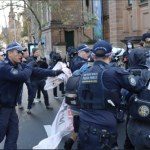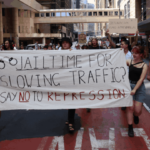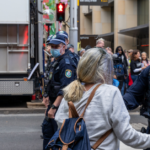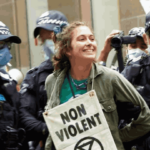Towards Rights-Based Bail, and the Chilling Effect of Extreme Conditions on Climate Action
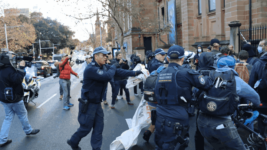
The last 12 months have been marked by a new tactic taken towards nonviolent direct actions carried out in the defence of climate and the environment, which has seen jurisdictions, such as NSW, Victoria and Tasmania, dramatically escalate the punishments that apply to such protests.
The anti-protest regime established by the Perrottet government in NSW last April, sees those taking part in unauthorised actions that obstruct roads, bridges, tunnels and major facilities no longer receiving fines in the hundreds, but instead facing 2 years imprisonment and/or a fine of $22,000.
Blockade Australia was one of two climate defence groups whose actions sparked the laws. But undeterred by them, Blockade climate defenders forged ahead with a week of disruptive actions planned for Sydney in late June, and it was at this time that police unleashed a massive crackdown.
Since that week of actions was brought to an end, there’s been a dearth in disruptive climate demonstrations, with this usually being put down to the draconian penalties that now apply.
However, according to long-term peace and climate activist Margaret Pestorius, the chilling effect on protest in NSW has more to do with the bail conditions applied to activists arrested during the police counterprotest operation, who are now facing potential gaol time.
Indeed, Pestorius posits that not only are increasingly severe bail conditions serving to prevent climate dissent, but they’re also acting as a form of pre-conviction punishment.
Silencing dissent
“There has been a lot of attention on the law, but the law is just a mechanism for the bail conditions, because that’s where the real control is, in the conditions,” said Pestorius, who’s currently subject to a set of extreme bail conditions due to her arrest for participating in a Blockade protest last June.
“I’m not allowed to associate with thirty people. If I do, I can be incarcerated immediately,” she continued, adding that she’s also been restricted from messaging apps, which leads her to believe she’s being surveilled, and she has to supply passwords to her phone or computer if requested by an officer.
The Beyond War activist educator advises that there’s a dozen Blockade Australia protest participants, like her, facing the new penalties, whilst another dozen are awaiting their appearance in court in relation to a pre-protest raid that NSW police carried out at a Colo property.
For mere participation in and not organisation of a June 2022 Sydney CBD action, Pestorius was arrested when standing at a bus stop days later and charged with two minor obstruction offences and one count of the harsh new section 144G offence under the Roads Act 1993 (NSW).
“I signed those draconian bail conditions thinking someone would then challenge them, but no one has assisted me in challenging them with human rights-based arguments,” Pestorius told Sydney Criminal Lawyers. “Every time I’ve tried, lawyers pretend there is no effect on me, when there is.”
Weaponisng bail
A new wave of climate protest kicked off in Sydney beginning with a Spring 2019 Extinction Rebellion rally, which saw dozens arrested for obstructing a CBD thoroughfare and led to subsequent complaints over severe bail conditions that were applied to those who were taken into custody.
“They had those bail conditions thrown out by the Supreme Court on the basis that they were lower-level charges,” Pestorius recalled of those who were arrested in Sydney in October 2019, “and it was found you couldn’t give such punitive bail conditions to a lower-level charge.”
So, this inability to apply heavy-handed bail conditions to summary offences led the Coalition government to enact serious crimes carrying harsh punishments in relation to climate actions, the activist added, in order to be able to hit protesters with crippling restrictions pre-trial.
And in turn, it’s these restrictions, which have been applied to key activists after the June 2022 Blockade Australia actions, that have led to caution regarding disruptive peaceful assembly in public spaces in Sydney and acute awareness of who we might be seen to be associating with, especially in NSW.
Rights-based bail
An issue arising out of this weaponisation of bail as a form of restricting climate action and to punish activists regardless of whether they’re ultimately charged, is that lawyers representing these activists are, to a large extent, accepting the steep conditions accompanying bail.
Pestorius asserts that whilst criminal lawyers are seriously concerned with keeping their clients out of prison, when it comes to the heightened conditions that are accompanying bail related to protest charges, legal representatives aren’t challenging them on a rights basis, which is what’s warranted.
“We need lawyers to contribute to a culture of self-representation, especially at this point in expanding the movement, because we can’t always find enough lawyers to help us,” the activist explained.
“We need to be able to hear lawyers making rights-based arguments against conditions, so we can replicate them, when they’re not available.”
Instead of presenting arguments against draconian bail conditions though, Pestorius continued, legal representatives are cutting backroom deals with police in relation to them, while it’s law enforcement that’s actively attempting to try and restrict political space for activists.
“It’s embedded in the structural process of the courts for lawyers to collaborate with their opponents to reduce time in front of the magistrate,” she made clear. “But for us, what happens in that space is we learn nothing, and bail conditions are becoming more constricting and punitive.”
The protesters from last June are waiting up to 11 months to face their charges, which means they’re also restricted from taking climate action over this time, and, as Pestorius points out, those caught up in the raid are out of action for up to 17 months.
Breaching international law
Pestorius is encouraging climate activists to not sign on to the steep bail conditions they’re presented with on arrest, as this is negating any need for criminal defence lawyers to present arguments during bail applications based on how the restrictions breach international human rights law to the courts.
In terms of how lawyers should approach such cases, the activist considers that legal representatives should engage with the political cause their clients are involved in, as well as develop arguments against draconian bail conditions broadly based on breaching rights and not specific individual cases.
“We need lawyers making these arguments because that’s how we, as activists, learn,” Pestorius explained. “We can listen and learn from what the lawyers argue, and we can then take those discourses and put them back through the system.”
In relation to rights-based arguments, the activist adds that bail, its refusal and the conditions accompanying it, are actually about “protecting the integrity of the court process”: an aim which has been lost in the application of extreme conditions in relation to disruptive climate protests.
Pestorius further points to a 1994 Victorian Supreme Court ruling that found bail conditions can’t be used as a form of injunction against protesting, and further bail itself is supposed to prevent punishment prior to conviction, yet these new long-term restrictions act in a punitive manner.
“When one aspect of the law impinges on general rights, that should be challenged,” Pestorius said in conclusion”. “Lawyers should be speaking out publicly about the application of bad laws, in this case bail conditions being used under such circumstances.”
“But all we have is lawyers justifying the bail to us. And then justifying it in front of the court.”


